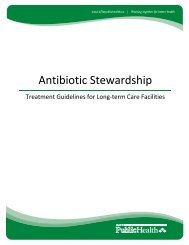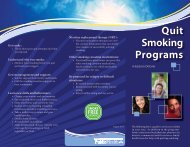130 Botulism - KFL&A Public Health
130 Botulism - KFL&A Public Health
130 Botulism - KFL&A Public Health
Create successful ePaper yourself
Turn your PDF publications into a flip-book with our unique Google optimized e-Paper software.
BOTULISM<br />
<strong>Botulism</strong> is serious but relatively rare illness caused by the toxin produced by the<br />
bacterium Clostridium botulinum. These bacteria are able to produce a protective<br />
casing, called a spore, that allows them to survive conditions such as cooking and<br />
drying. Clostridium botulinum spores are commonly found in soil and therefore can be<br />
found on agricultural products. There are three forms of botulism: food borne, wound,<br />
and intestinal (infant and adult).<br />
Food borne botulism results from eating a food contaminated with the botulism toxin.<br />
Food may become contaminated with the toxin through improper preserving, cooling<br />
or storage. Improper home canning of low acid, low salt foods (such as vegetables<br />
and fruit) is the most common risk factor for botulism. If, during canning, food is not<br />
heated to a high enough temperature to kill the bacterial spores (120 o C/248 o F for at<br />
least 10 minutes), the bacteria will be able to produce the toxin inside the sealed can.<br />
Other foods that have caused botulism include foil wrapped baked potatoes that were<br />
not refrigerated after cooking (the foil provided the airtight conditions these bacteria<br />
prefer, while the potatoes provided the bacteria); garlic in oil products that were not<br />
refrigerated after opening (the oil provided airtight conditions for bacteria that were on<br />
the garlic) and lightly fermented fish and smoked meat. The toxin can be destroyed by<br />
boiling foods (85 o C/185 o F) for at least five minutes.<br />
Symptoms: initially may include vomiting and/or diarrhea, followed by one or more<br />
of the following: vertigo, weakness, dry mouth, difficulty swallowing, blurred or double<br />
vision, constipation, followed by descending muscle paralysis and respiratory failure.<br />
<strong>Botulism</strong> can be fatal if not treated promptly.<br />
Incubation period: symptoms usually occur 12 to 36 hours after eating the<br />
contaminated food, but can also occur as early as 6 hours or as late as 10 days.<br />
The shorter the incubation period, the more severe the disease is.<br />
Intestinal botulism can occur in infants under 1 year of age, and in adults with<br />
altered gastro-intestinal anatomy and micro flora. Illness occurs when Clostridium<br />
botulinum spores are ingested, and are able to produce the toxin in the intestinal tract.<br />
Unpasteurized honey is a suspected source of infant botulism.<br />
Symptoms: constipation followed by lethargy, loss of appetite, difficulty swallowing,<br />
weakness (floppy baby) and altered cry. In adults the symptoms are similar to those<br />
for food borne botulism.<br />
Incubation Period: unknown.<br />
... over
Wound botulism occurs when the spores get into an open wound, and are able to reproduce in an anaerobic<br />
(without oxygen) environment, usually associated with severe trauma.<br />
Symptoms: similar to those of food borne botulism, without vomiting and diarrhea.<br />
Incubation Period: about 10 days.<br />
How can you prevent botulism?<br />
• Use a pressure canner when preserving low acid foods (such as vegetables, fruit and meats) and<br />
follow the instructions for the product you are preserving.<br />
• Cool cooked foods quickly and store them in the refrigerator (4 o<br />
C/40 o F or colder).<br />
• Do not use canned goods with bulging lids or other signs of damage.<br />
FS <strong>130</strong><br />
Rev. 11/05/10<br />
page 2
















